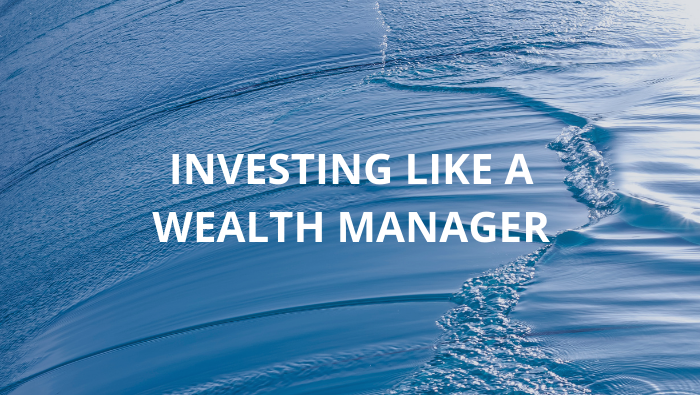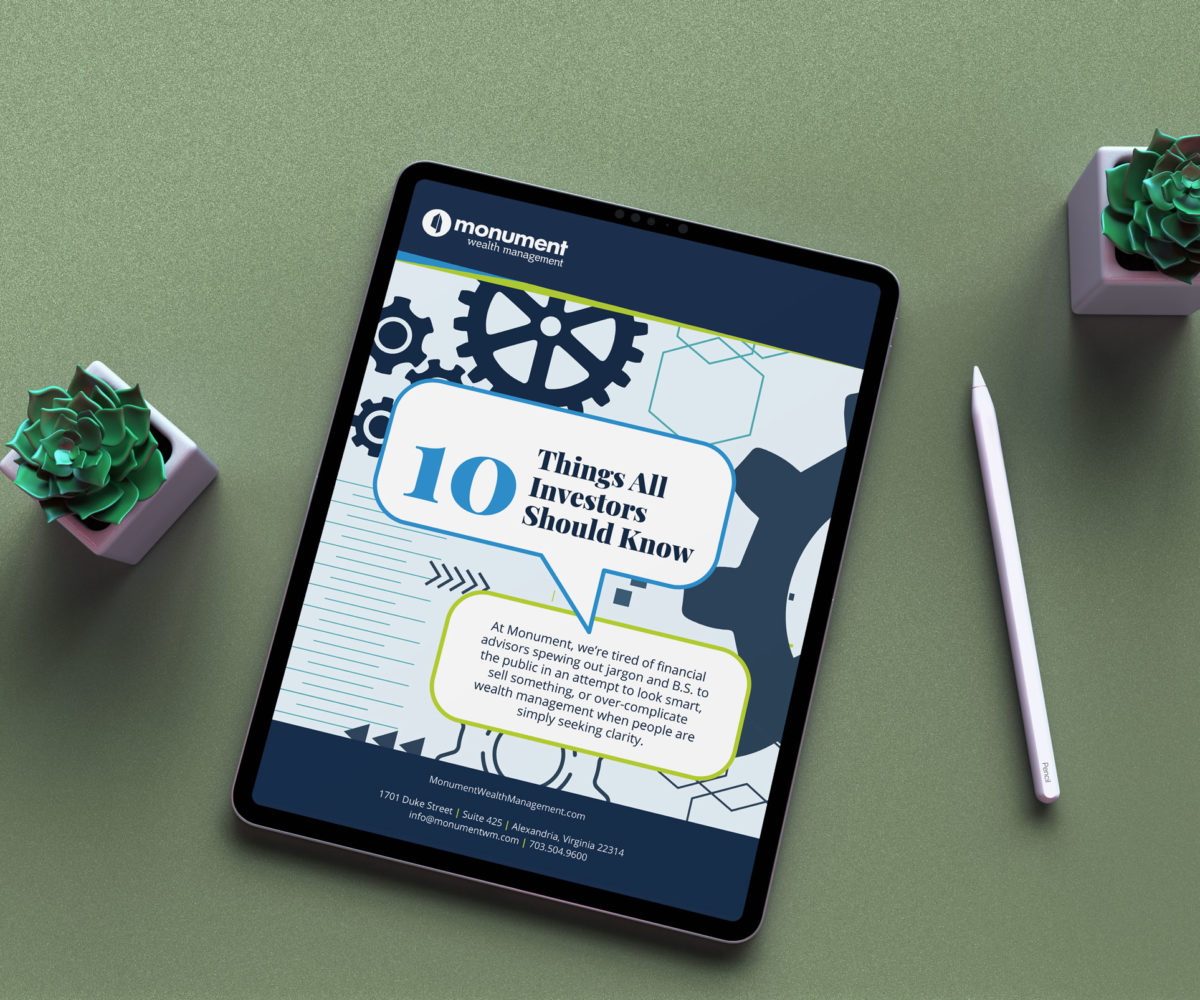Monument Wealth Management Articles
How To Invest An Inheritance Like A Wealth Advisor

Share on your favorite platform, or by email
Receiving an inheritance is overwhelming—especially when your loved one had specific wishes for how the inheritance should be used. You may quickly realize how many options you have and that you don’t know the best way to maximize your newfound wealth while fulfilling those wishes.
Many people run into the same dilemma and make rash decisions—a study from the Bureau of Labor Statistics found that nearly one-third of people who received an inheritance had negative savings by the second year. Fret not, there is a way to invest your inheritance so you can protect and grow it while carrying on the legacy of the person who passed it down to you.
Don’t rush to take action–clarify what the money’s for
First and foremost, don’t do anything for a while—let the idea of having this large sum of money settle before you take action. Remember, money can only go one of three places–let’s call them buckets. First, you can spend it during your lifetime. After that, it goes three other places–friends and family, charity, and/or taxes. So while it sits there, clarify exactly what your goals are, and prioritize them among those 4 buckets.
Then, take the time to lay the groundwork that will support your goals and objectives (account titling, earmarking funds for specific goals, etc.). Getting those few big decisions right is critical and will have a great impact on your long-term wealth.
With all this in mind, it’s ok to spend a little of your windfall after you get used to having it. The key is having a well-thought-out plan for how you’ll spend that portion and invest the rest of it first. Your plan will help you know exactly how much you can splurge on yourself without the worry of overspending.
Be honest about risk tolerance and the risk your goals require
It’s easy to be enthusiastic about risk in a bull market, especially when you have a large sum of money to play with. How did you feel in March 2020 when the market declined significantly in response to COVID? Losing your inheritance in a similar event wouldn’t feel great.
Create an allocation that you can remain invested in through the market’s ups and downs. Treat your inheritance as if it were regular money you earned and investing for the longer term. That might mean keeping some cash to maintain a margin of safety and avoid ill-timed sales of stocks in moments of volatility.
Keep in mind your time horizon, too. Are those goals you planned for coming up soon? Or do you have a few decades before they become a reality? Your allocation may change depending on your time horizon.
Keep it simple—there’s elegance in simplicity
You don’t need a portfolio full of expensive products (such as PE funds or alternative investments) to maintain or grow your wealth. Sure, they may have a place depending on your goals and objectives. However, they shouldn’t be the entirety or even a large percentage of your portfolio.
Instead, keep things simple. You most likely won’t need to make massive gains quickly on such a large sum of money—investments that offer slow and steady returns at a low cost are almost always a better option here. If you can achieve small, consistent returns on your inheritance, that could be plenty to reach your goals.
Also, by keeping fees low, you can squeeze even more returns out of every dollar of your windfall. That goes for both investment and advisor fees. A fee-only fiduciary—like Monument Wealth Management—must put your best interests first, which can help you keep fees to a minimum.
Need help managing an inheritance?
Did you receive an inheritance recently? You don’t have to create a wealth plan alone.
Monument Wealth Management has decades of experience helping clients with scenarios just like these. We take a highly customized approach to your finances we call Private Wealth Design. We’ll help you navigate the inheritance process and create a plan to make the most of your inheritance while carrying on the benefactor’s legacy.
Reach out if you’re ready for us to help you figure out how to use your inheritance and maximize your wealth.

Don’t miss our list of “10 Things All Investors Should Know”
Ready for straightforward, unfiltered opinion and tailored advice for YOUR questions, not everyone else’s?
IMPORTANT DISCLOSURE INFORMATION
Please remember that past performance is no guarantee of future results. Different types of investments involve varying degrees of risk, and there can be no assurance that the future performance of any specific investment, investment strategy, or product (including the investments and/or investment strategies recommended or undertaken by Monument Capital Management, LLC [“Monument”]), or any non-investment related content, made reference to directly or indirectly in this blog will be profitable, equal any corresponding indicated historical performance level(s), be suitable for your portfolio or individual situation, or prove successful. Due to various factors, including changing market conditions and/or applicable laws, the content may no longer be reflective of current opinions or positions. Moreover, you should not assume that any discussion or information contained in this blog serves as the receipt of, or as a substitute for, personalized investment advice from Monument. To the extent that a reader has any questions regarding the applicability of any specific issue discussed above to his/her individual situation, he/she is encouraged to consult with the professional advisor of his/her choosing. No amount of prior experience or success should be construed that a certain level of results or satisfaction will be achieved if Monument is engaged, or continues to be engaged, to provide investment advisory services. Monument is neither a law firm nor a certified public accounting firm and no portion of the blog content should be construed as legal or accounting advice.
A copy of Monument’s current written disclosure Brochure discussing our advisory services and fees is available for review upon request or at www.monumentwealthmanagement.com/disclosures. Please Note: Monument does not make any representations or warranties as to the accuracy, timeliness, suitability, completeness, or relevance of any information prepared by any unaffiliated third party, whether linked to Monument’s website or blog or incorporated herein, and takes no responsibility for any such content. All such information is provided solely for convenience purposes only and all users thereof should be guided accordingly.
Historical performance results for investment indices, benchmarks, and/or categories have been provided for general informational/comparison purposes only, and generally do not reflect the deduction of transaction and/or custodial charges, the deduction of an investment management fee, nor the impact of taxes, the incurrence of which would have the effect of decreasing historical performance results. It should not be assumed that your Monument account holdings correspond directly to any comparative indices or categories. Please Also Note: (1) performance results do not reflect the impact of taxes; (2) comparative benchmarks/indices may be more or less volatile than your Monument accounts; and, (3) a description of each comparative benchmark/index is available upon request.
Please Remember: If you are a Monument client, please contact Monument, in writing, if there are any changes in your personal/financial situation or investment objectives for the purpose of reviewing/evaluating/revising our previous recommendations and/or services, or if you would like to impose, add, or to modify any reasonable restrictions to our investment advisory services. Unless, and until, you notify us, in writing, to the contrary, we shall continue to provide services as we do currently. Please Also Remember to advise us if you have not been receiving account statements (at least quarterly) from the account custodian.